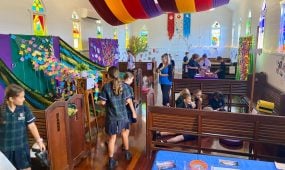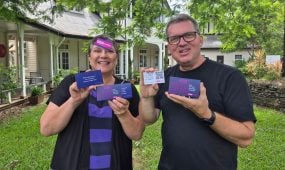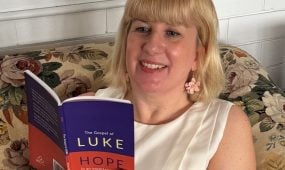Renewing the Church from the edge with disruptive prophets and uncomfortable conversations
Resources & Research
“If the Church is to be renewed from the edge it must make space for the edge to come to the centre. That space needs to be open to disruptive prophets and uncomfortable conversations – and accessible,” say Fiona MacMillan and The Rev’d Jonathan Evens from St Martin-in-the-Fields
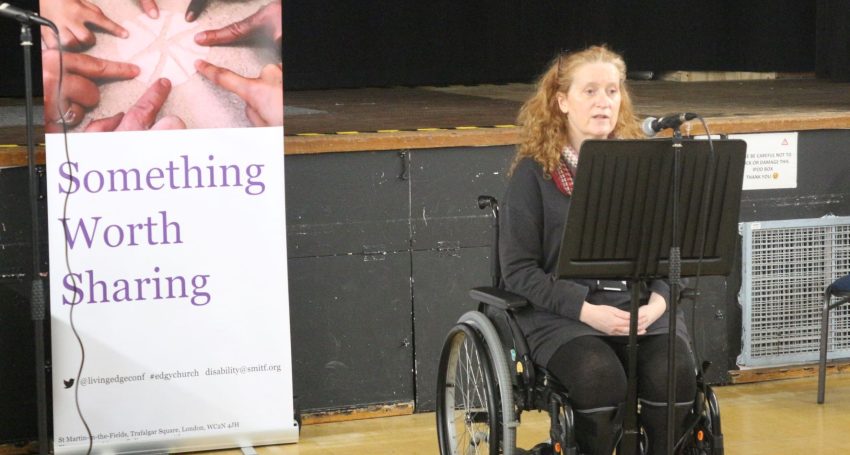
“At the heart. On the edge.” is the vision statement of St Martin-in-the-Fields, based in the north-east corner of Trafalgar Square. The elision of “heart” and “edge” provided the name for our international ecumenical movement for renewal of the broad Church, which was initiated from St Martin’s in 2017.
HeartEdge seeks to galvanise churches – through the 4 C’s of commerce, culture, compassion and congregation – to be at the heart of their communities, while also being with those on the edge. The “edge” is both the margins of Church and that of our wider communities, while the “cutting edge” is where new initiatives are seeded and grow. We believe that renewal comes from the edge, as the Holy Spirit works both within and outside the Church.
The Church, as an institution, has often failed to see and receive the abundant gifts God is continually providing in or through those who are on the edge. Often God’s gifts, as was the case with Jesus of Nazareth, are rejected rather than embraced.
With that ethos, HeartEdge actively seeks out new and emerging voices in the field of mission. It aims to open up conversations about those areas of Church life where particular groups have historically been excluded, by providing platforms for those with lived experience of exclusion.
One example is the ongoing seminar series Shut In, Shut Out, Shut Up, which builds on the voices of lived experience that have emerged from 10 annual conferences on disability and church led by a partnership between St Martin-in-the-Fields and Inclusive Church.
Inclusive Church is a UK-based education charity that works to end exclusion in churches through education and via a growing network of churches, partners and ambassadors. Initially Anglican, and with a primary focus on women’s ministry and human sexuality, the charity now works ecumenically and internationally, with the broader understanding that “all exclusion is the same exclusion”.
Advertisement
The host of this series is Fiona MacMillan, who chairs St Martin’s Disability Advisory Group, is a trustee of Inclusive Church, and leads the planning team for these annual Living Edge conferences.
The Living Edge conferences provide a space for disabled people* to gather and to resource each other and the Church. Disabled people are often isolated by experience or geography and find strength in sharing ideas, reflecting on faith and exploring understanding of God. St Martin’s and Inclusive Church hold the space, while the content is planned by a team of disabled.
The voices and experience of disabled people are prioritised at these annual conferences because they are rarely heard in Church contexts where conversations tend to be about disability rather than listening to disabled people.
These are also disruptive prophets. The idea of disabled people as prophets came from our 2014 conference, “Transforming our Vision”. Led by the Australian blind theologian John Hull, we considered vision as sight, insight and hope. John suggested that disabled people have a distinct prophetic ministry to the Church and that, in order for the Church be the Church, to fulfil its prophetic ministry to society, it needs disabled people. He challenged disabled people to be prophets to the Church.
Advertisement
Prophetic ministry has to come from those on the edge, who are both inside and outside. Many people find themselves outside church for the first time after acquired impairments or chronic illness. Methodist minister Donald Eadie joined us by pre-recorded video in 2016 and spoke of how he was forced to take early retirement after developing a disabling spinal condition. The Church could not envision a ministry from someone working part-time and sitting down. He lived in pain, both physical and spiritual:
“My faith journey went into meltdown, the understanding of the nature and ways of God, the way of living the lifelong vocation.”
Donald spoke of the new ministry within his more restricted life, finding new companions on the journey and sharing his growing understanding of God in new ways:
“My world cracked open and life broke through.”
He shared the practice of disabled people anointing each other after the Eucharist – not for healing, but for prophetic presence in the life of the world.
The Shut In Shut Out Shut Up series shares some of the experience emerging from the conferences, exploring issues and ideas across current practice and systemic barriers, outdated beliefs and cutting-edge thinking. The series is an exemplar in terms of centring the experience of those on the edge, who bring both wisdom and challenge. Like the conference, it begins from the premise of holding space for disabled people to lead the conversation. Where the conference is primarily a gathering space for disabled to explore faith and theology together, in the Shut In Shut Out Shut Up seminars disabled people discuss ideas with a wider audience – people on the edge of Church or the wider community, Church leaders and professionals from other fields.
Conversations have covered a wide range of issues – disability as a social justice issue; intersectional experience of neurodiversity, gender; sexuality; ableism and the Church. Each event combines speakers in panel conversation, with time allocated for small groups because we recognise that everyone who comes has something worth sharing.
The conferences and seminars build in access from the beginning, rather than adding it on. We routinely provide access information for each event, including, for example, timings and descriptions of activities, captions (live or automatic) and sign language. We also audio describe visual material and provide written materials in advance, using more accessible fonts. We understand that access is about a culture rather than a tick list, offering a willingness to do what we can to open the conversation as widely as possible. We recognise that what we have won’t always work for everyone, that we will make mistakes and learn from them, and that we will always do our best with the resources that we have.
To live with impairment, illness, cognitive diversity or mental ill health is hard when the Church, like society, is built and run by and for the well. Providing access information takes the labour from the individual, removing some of the barriers to participation. It sends a message that we have genuinely thought about and truly welcome people with diverse access requirements. People will come to an event if they know it will be accessible to them without the burden of always having to fit in, to ask, or to adapt around.
However, our work recognises that rather than simply being ministered to, disabled people have something critical to offer – a vital ministry to the Church, including the experience of being outside and othered, the Gospel paradox of strength in weakness, and the daily lived reality of dependence on one another and on God. To be disabled is not to be unable but to be different from, perhaps to do things in different ways – where there is space that allows for difference.
Related Story
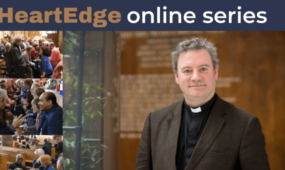 Reflections
Reflections
HeartEdge: commerce, culture, congregation and compassion
The work we have done together has grown through trust, openness and a willingness to learn from one another. If the Church is to be renewed from the edge it must make space for the edge to come to the centre. That space needs to be open to disruptive prophets and uncomfortable conversations – and accessible.
To find out more about HeartEdge or to participate in the ongoing Shut In Shut Out Shut Up seminar series, please visit the HeartEdge website.
Resources
This Something Worth Sharing booklet contains ideas, responses and resources from our 2018 conference. It explores access and theology, language and structures, communication and participation.
This Calling from the Edge booklet celebrates the first five ‘Living Edge’ conferences.
* At HeartEdge we use the social model term “disabled people”, rather than “people living with disability” or similar. The social model of disability says that people come in different bodies, minds and ways of being in the world and are disabled by environment being set up for one type of body, mind or way of being. The issue is within society and being disabled – life being made difficult – a daily experience for people with impairments, chronic illness, mental health issues or neurodiversity. The medical model says the issue is within the person, who needs to be “fixed” in order to be included.


